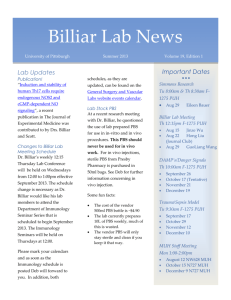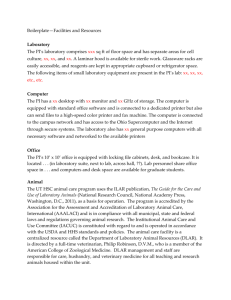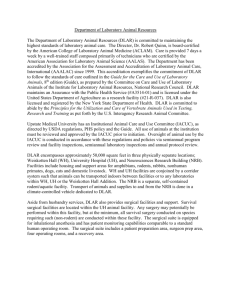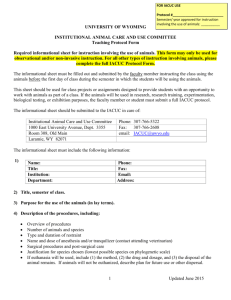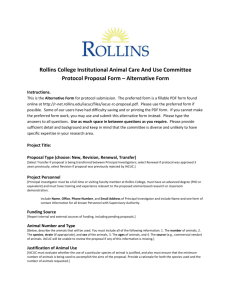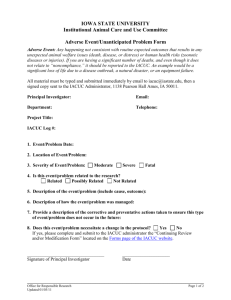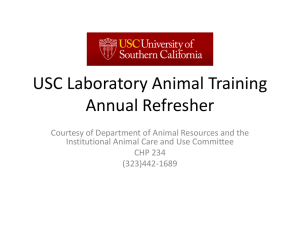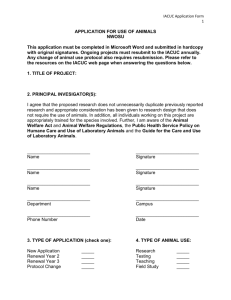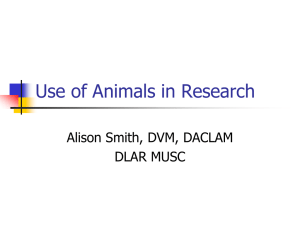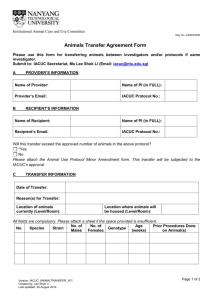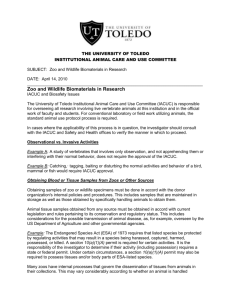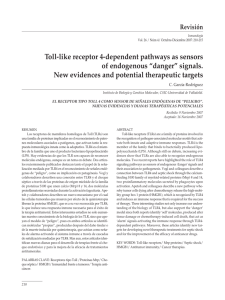March, April, May 2013 - General Surgery and Vascular Labs
advertisement
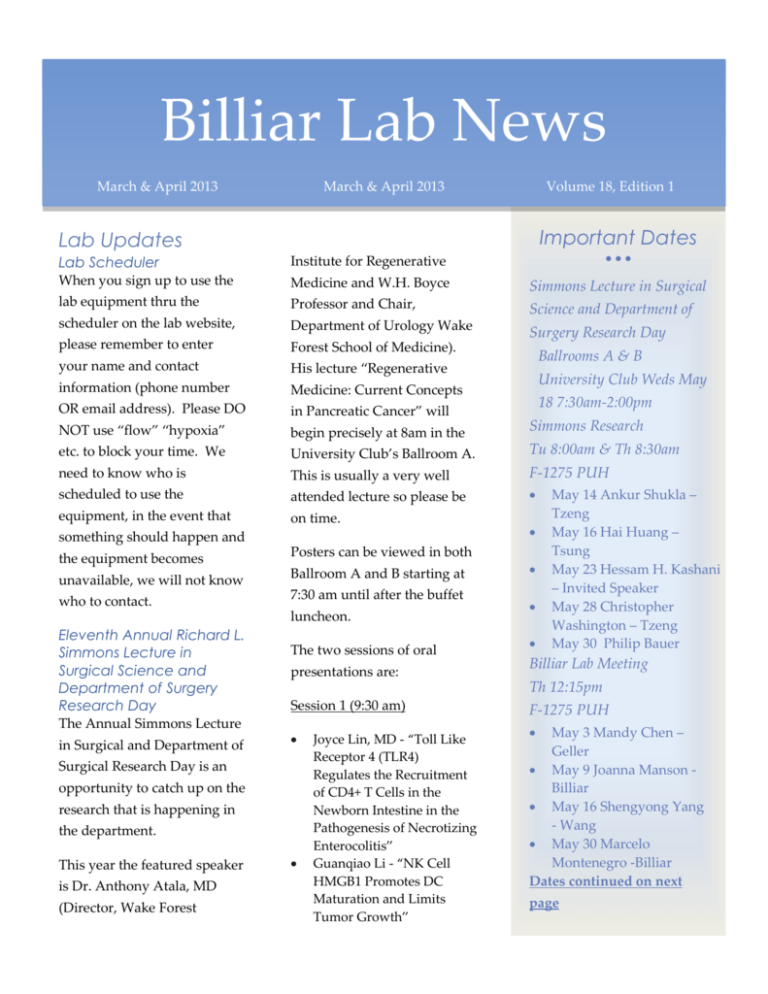
Billiar Lab News March & April 2013 March & April 2013 Volume 18, Edition 1 Important Dates Lab Updates Lab Scheduler When you sign up to use the lab equipment thru the scheduler on the lab website, please remember to enter your name and contact information (phone number OR email address). Please DO NOT use “flow” “hypoxia” etc. to block your time. We need to know who is scheduled to use the equipment, in the event that something should happen and the equipment becomes unavailable, we will not know who to contact. Institute for Regenerative Medicine and W.H. Boyce Simmons Lecture in Surgical Professor and Chair, Science and Department of Department of Urology Wake Surgery Research Day Forest School of Medicine). This year the featured speaker is Dr. Anthony Atala, MD (Director, Wake Forest University Club Weds May Medicine: Current Concepts 18 7:30am-2:00pm in Pancreatic Cancer” will begin precisely at 8am in the Simmons Research University Club’s Ballroom A. Tu 8:00am & Th 8:30am This is usually a very well F-1275 PUH attended lecture so please be on time. Posters can be viewed in both Ballroom A and B starting at 7:30 am until after the buffet luncheon. Eleventh Annual Richard L. Simmons Lecture in Surgical Science and Department of Surgery Research Day The Annual Simmons Lecture in Surgical and Department of Surgical Research Day is an opportunity to catch up on the research that is happening in the department. Ballrooms A & B His lecture “Regenerative The two sessions of oral presentations are: May 14 Ankur Shukla – Tzeng May 16 Hai Huang – Tsung May 23 Hessam H. Kashani – Invited Speaker May 28 Christopher Washington – Tzeng May 30 Philip Bauer Billiar Lab Meeting Th 12:15pm Session 1 (9:30 am) Joyce Lin, MD - “Toll Like Receptor 4 (TLR4) Regulates the Recruitment of CD4+ T Cells in the Newborn Intestine in the Pathogenesis of Necrotizing Enterocolitis” Guanqiao Li - “NK Cell HMGB1 Promotes DC Maturation and Limits Tumor Growth” F-1275 PUH May 3 Mandy Chen – Geller May 9 Joanna Manson Billiar May 16 Shengyong Yang - Wang May 30 Marcelo Montenegro -Billiar Dates continued on next page Important Dates Continued Danger Signals Meeting Tuesday 2:00pm F-1275 PUH May 14 June 10 July 9 Session 2 (11:15am) Journal Club Th 12:15pm F-1275 PUH June 27 July 25 University Holiday May 27 Memorial Day Dysfunction is Limited by Inhaled Carbon Monoxide or Nebulized Sodium Nitrite as Adjuncts to Standard Resuscitation” Kent Zettel, MD - “DC Play an Unexpected Role in TLR4 Dependent Inflammation and Organ Damage Following Hemorrhagic Shock with Tissue Trauma” Yousef El-Gohary MA, MD, MRCS - “Direct Evidence that Pancreatic Ducts are a Source for New Beta Cells During the Juvenile Period and During Regeneration” Daniel Escobar “Hemorrhagic ShockInduced Mitochondrial Brian Boone, MD - “Phase I/II Trial of Autophagy Inhibition in Combination with Neoadjuvant Gemcitabine in High Risk Pancreatic denocarcinoma: Safety, Clinical Response, and Correlative Studies” Eileen Bauer, PhD “Chloroquine, a Pharmacological Inhibitor of Autophagy, Attenuates Hypoxia-Induced Pulmonary Hypertension” Rami Namas, MD, MRCS “Circulating Biomarker Networks Differentiate Susceptibility to Infection Following Trauma in Humans” Joshua Brown, MD - “Goal Directed Resuscitation in the Prehospital Setting: A Propensity Adjusted Analysis” Kelly Benabou - “Role of Toll-like Receptor (TLR)-2 Signaling in Promoting Angiogenesis After Ischemia” 52nd Annual Greek Food Festival Saint Nicholas Greek Orthodox Cathedral’s annual Greek Food Festival will be held Sunday, May 12 through Saturday May 18. Serving hours are: Sunday – Noon to 8pm; Monday to Thursday – 11am to 9pm; and Friday and Saturday – 11am to 10pm. Live Bouzouki music and Greek dancing will be held every evening. Take out service is available. Visit their website at www.stnickspgh.org for a fax or email form. Fax orders will be accepted on for lunches. A Message from IACUC Last August, the University management community was apprised that conflicts of interest. the Public Health Service (PHS) had revised regulations related to conflict of interest. In response, the University updated procedures for information its soliciting related to conflicts of interest, as well as Information updated of potential questions in protocol forms about the regulations and related University policies is available on the Conflict of Interest Office website: http://www.coi.pitt.e du. The IACUC has updated the related to conflict of interest. In the future, when completing a protocol application via Animal Research Online (http://aro.pitt.edu), investigators will be required to answer one of two sets of questions related to conflict of questions similar to those annual renewal, an IACUC interest. study asked in the past will be Office described in the protocol is provided. For existing studies prompt funded in part or in total by that using investigator to open protocols PHS agencies (e.g., National the ARO system, the system related to PHS-funded studies Institutes of Health, Centers will via the modification process for Disease Control, Food and investigators to answer the and Drug new conflict If the Administration), questions provided reflect new the the will mandates required by PHS regulations and related University policies. If the study is not funded by PHS agencies, are modified automatically conflict questions prompt of when interest a new modification is submitted. modified system is before the member the answer will principal the of revised interest questions. Protocols that do not indicate a PHS funding If an approved protocol in the ARO staff not next source will not need to be updated at annual renewal, although as noted above the new conflict of interest Faculty Highlight- Eileen Bauer Officially I am faculty here at Pitt with the title of research instructor. I am working in the laboratory of Dr. Michael Bauer (yes, same last names …) and joined his lab right after his move from the BST3 back into the BST1, which was about 3 years ago. Born in 1971 in Germany I found myself madly in love as a teenager with an American from Santa Barbara (no, not my husband) and left Germany for him to be in Southern California where I ended up graduating with a BS in Cell and Molecular Biology from UCLA. I already was passionate about research as undergraduate and worked in a Drosophila lab, volunteered in a breast cancer lab, and volunteered on the bone marrow transplant floor at UCLA’s hospital helping nurses with things like washing patients, getting them papers or just trying to make their pains a little bit more tolerable. While my husband to be was accepted into UCLA’s graduate program, I was not, and ended up working there several years as lab technician. 3 kids later and in Pittsburgh PA I finally had the chance to fulfill my dream when I was accepted into the graduate program of toxicology in Dr. Bruce Pitt’s Dept. of EOH. I graduated in 2010. I am interested in a proliferative disease of the lung called pulmonary hypertension (PH), which is generally categorized as a cardiovascular disease leading to fatal right heart failure over time. However, due to lack of success of current vasodilatory therapies to stop or cure the disease, I am convinced that part of the key lies in our innate immune system and that is exactly what I am studying. My projects focus on the role of TLR4 and thus HMGB1 in PH, platelets in PH, drugs like interferon alpha in PH and its effect on the immune system, immunotherapies of interleukin-2 transferred from the cancer world to my proliferative disease (with the help of Dr. Lotze), the role if natural killer cells in PH, complement in PH, and the role of autophagy in PH. I have become increasingly more and more excited by lung cancer research as well and recently proposed a clinical human trial using chloroquine as a neoadjuvant autohopagy inhibitor in patients with resectable lung cancer (with the help of Drs. Lotze, Landreneau, and Amaravadi). I am also involved in a project studying the effect of hypoxia in a K-ras lung cancer model with Dr. Gregory and Dr. Shapiro. My head is filled with ideas, but I am in need of man power, so if you are excited about these projects and like to volunteer, please contact us! As for my life outside the lab - I do not have one. No, I am married and have 3 kids (2 boys, ages 10 and 14 and a girl, age 12) and 2 dogs (Border collie mix and a collie – Lassie dog) and we all live walking distance from the university and the kids’ schools. Our kids have various interests ranging from sports to music and so most of my free time involves making sure that everyone is at their appropriate practice or game, that there is dinner on the table, and that we have clean clothes to wear. In addition to the daily chores I have found one great counterbalance to my busy work schedule, which is running. I truly enjoy long distance running and have completed 5 marathons so far since last summer. It creates a beautiful challenge for me and presents a fight against myself in terms of how far I can push myself. It is a very mental sport and it amazes me to experience what I think is my limit just to realize that it is not really my body hitting the wall, but it is all in my head. And to learn to find this door in my mind that will give me that extra drive to beat my time and push harder is a great challenge. My husband Mike is also running with me, however, he is faster, and stronger and if you want to see us run through the city you need to get up around 4-4:30 am since we do it very early so that it doesn’t affect the kids’ as much. My goal: to run the marathon in Nepal at the base of Mount Everest and to experience hypoxia first hand. questions must be completed conflict of interest questions system at any point, without the first time the protocol is in waiting modified. For protocols that form. These questions must required have not yet been transitioned be answered in order for the renewal". to annual system has many benefits that the electronic ARO system (i.e., protocols submitted prior to January, 2012 as Microsoft documents), the Word IACUC Office will include the revised the annual renewal renewal to be processed. As a to complete "three a year The ARO streamline the completion and reminder, any investigator can transition an older protocol submitted as a Word document to the ARO management of IACUC protocols. Such submissions will be subject to the standard IACUC review process. New IACUC Policy and Guidelines for Animal Transport The transport through of and animals edu/sop/restricted/Transport. between pdf . University buildings is often necessary in animal research. It is important when The related guidelines can be downloaded from: transporting animals that all http://www.iacuc2.pitt.edu/so applicable p/restricted/TransportGuideli laws University and and UPMC that the welfare of both the The Animal animals and the public is Guidelines include protected. We must ensure information to facilitate safe that animals are appropriately and secure animal transport. housed and that visitors, staff These guidelines also include members, an appendix listing all of the hospital Please welcome the following new people nes.pdf regulations be followed, so and New Faces Transport specific Asst (Billiar Lab) Ana Maria Quintero Botero – Visiting Scholar (Zuckerbraun Lab) accepted exposed being routes; these routes may be Nikki Buijs – Visiting Many copied and pasted into the Scholar (Geller Lab) individuals have allergies to relevant section of an IACUC particular animal species, and protocol submission. transported. animals their health can be seriously impacted by exposure to those species. note that animals cannot be removed from a The Animal Transport Policy be downloaded from: https://www.iacuc2.pitt. transport is included in an approved IACUC protocol. Katheryn Vreeland – Fellow (Zuckerbraun Lab) housing facility unless this Animal Transport Policy and Guidelines Accordingly, the IACUC has developed and approved a new policy and guidelines rel ated to the transport of animals from University of Pittsburgh animal housing facilities to IACUC-approved research sites including investigator laboratories. can Please transport Frances Goglio – Breeding patients are not unnecessarily to animal into our labs: The Animal Yao Liu – Visiting Scholar (Tsung Lab) Good Luck Transport Policy requires that We’d like to extend our best the wishes to Juan Wang from primary transport caging/device, secondary containment procedures, and transport moving route an used animal in be described in detail in the protocol. All personnel must adhere to the Animal Transport policy, as well as the information related to the Fan lab who will be leaving in May animal transport provided in Staff Highlight – Kathy DiGiacomo I have been in the lab since 1999 and most days that seems like only yesterday! I came to the University from a primary care/cardiology office where I was the Office Manager. I am involved in many aspects of our labs from sending numerous emails to grant submissions to orders to working on our website. I enjoy working with everyone in our large group and am always available if you have questions. the approved IACUC protocol to which an animal is assigned. Deb has purchased two rolling coolers that are to be used by Montefiore personnel for animal transport that are in compliance with these new policies. They can be found I am very proud to say that I am born and raised in Pittsburgh. I in NW636. Please have been married to my husband, Steve, for 32 years now and we discontinue the use of the are the proud parents of Kristin and Matthew. My husband and I postal boxes as a transport love to vacation in Myrtle Beach, SC. Often we try to get there at mechanism least once a year, if not twice! It is our favorite spot to visit (hoping to re-locate there in a few years) and we have fond memories of taking our children since they were little. Almost three years ago, I received one of the best presents ever when I became a grandmother. Aidan (or AJ as we call him) has become the brightest spot on even the darkest day. Becoming AJ’s “Gam-ma” has been a complete blessing! My favorite thing to do is just spending time with my family!! I am also an avid Pittsburgh sports fan, actually the whole family is (even AJ) - we even cheer for the Pirates!! DLAR Reorganization Update Dr. David G. Schabdach, Senior Executive Director, and University Attending Veterinarian Colleagues, A reorganization of the DLAR began shortly after my arrival last July. The purpose of the reorganization is to create a more customer focused, responsive, and transparent organization committed to providing animal high quality husbandry and welfare, veterinary care, and research support that meet current program needs, protect the health of our animal maintain colonies, and productive collaborations Institutional with our Animal Care close proximity to each other In the upcoming months, the in DLAR order to enhance organization chart and Use Committee (IACUC) communication, and Research Conduct and transparency, Compliance Office (RCCO). operations, The will responsiveness to customers. reorganization process, we additional Investigators and research will personnel are encouraged to opportunities to formally implement, but I work additional efficiencies, wanted to update you on the facility and increase productivity, and progress in supervisor to address animal ensure fiscal responsibility transforming our operating husbandry or welfare needs, without adversely impacting culture and environment. veterinary care or animal the quality of our program or study placing the health status of entire process require several months to complete and made A new model for operating and managing DLAR animal facilities recently went into effect that operational enhances efficiency streamlines our and decision making process to better serve the facility and directly with the veterinarian support, and any DLAR personnel issues. The facility veterinarian supervisor under list is "Contact" and posted on DLAR the website at http://www.dlar.pitt.edu. revised and implemented. As we continue with actively the pursue gain the animal colonies at risk. Please feel free to contact me if you have any suggestions or questions regarding the DLAR reorganization. Please contact the site veterinarian Facilities are grouped into or community. Local leadership sites feedback consisting facility operating model based on operation and management veterinarian and supervisor the location, the nature of of the vivarium utilized for are work research, the primary species your animal studies. together and make decisions housed, and the ability to related to the operations and share resources. Site leaders management of the facility, provide animal health and welfare, guidance and customer support while leadership on broader issues maintaining consistency with that federal regulations, industry facilities standards, and institutional decisions. policies and procedures. management of research and job descriptions will be the empowered to Veterinarian and supervisor offices are now located in under the new support to the involve or and facility multiple higher DLAR level upper remains responsible for the highest level of decisions involving program issues. supervisor Regards, Dave with any concerning the Colony Status: As of May 2, 2013 Established Colonies iNos KO TrifLPS-2 CD14 KO Myd88 KO* (experiencing breeding difficulties – started a backcrossing colony) Myd88 WT* (experiencing breeding difficulties – started a backcrossing colony) TLR9CpG1/CpG1 Jα281-/Colonies in Development ATF3 KO Caspase 11 Gt(Rosa) HC TLR4 KO TLR4 KO/RAGE KO TLR4 flox Lyz Cre TLR4 KO TLR4 KO (global) Adipose TLR4KO Het TLR4KO/TLR4flox HMGB1 flox RAGE KO HC HMGB1 KO C3 KO NFKB luc TLR2 KO NFKB WT Caspase1KO* Pf4creTLR4 KO DC TLR4 KO Pf4creHMGB1flox TLR4 KO/TL9CpG1/CpG1 TLR4 KO x TLR2 KO Nalp 3 KO* AIM2 KO (small quantities) Cathespin L KO (arrived as +/-, will begin backcrossing) Myd88 flox Strains Available from Collaborators CAV KO (Michael Bauer) TSP-1 KO (A. Chen) IFNabR KO (M. Bauer) TSP-2 KO (A. Chen) IRF-2 KO (David Geller) CD36 KO (A. Chen) eNos GCHtg (A. Chen) hph-1 (A. Chen) Cryopreserved Strains *at Jackons Labs unless otherwise noted eNos tg EGR1 KO CD36 KO IFNabR KO TLR2 KO TLR-9 (eggs, in house) AIM2 KO TLR-4 flox (under Hackam) GDF-15 KO (Yoram Vodovotz) TLR-4 KO (Taconic, under Hackam) HMGB1+/- Stud Colonies TLR4 KO x CD11c TLR4 x Fab cre TLR-4 KO x Pf4 cre TLR4 KO x Albumin Cre TLR4 KO x Lyz Cre Myd88 flox x Lyz cre HMGB1 flox x Albumin Cre HMGB1 flox x Pf4 cre Myd88 flox x Alb Cre If you have any questions regarding the contents of this newsletter, contact Deb Williams (williamsd8@upmc.edu) If you have any questions regarding the contents of this newsletter, contact Deb Williams (williamsd8@upmc.edu) If you know of anything exciting or newsworthy going on in the lab that you want to share with others email Alicia Frank (franka@upmc.edu) with the information If you know of anything exciting or newsworthy going on in the lab that you want to share with others email Alicia Frank (franka@upmc.edu) with the information For more information, please visit the General and Vascular Surgery Labs website (http://www.gensurgerylabs.pitt.edu/) For more information, please visit the General and Vascular Surgery Labs website
